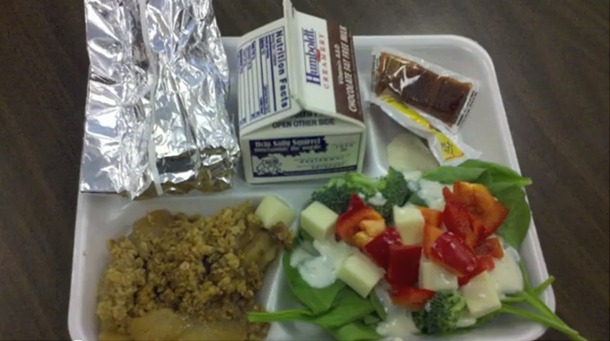
Share On Social!
If you could wave a magic wand, what would you do to fix school lunches? If money was no option, what would you do to bring healthier foods into schools?
These are the kinds of questions students at Sunset High School in Del Norte County, California asked while dreaming-up big solutions to their less-than-great school food. Fed up with the pre-packaged lunches and unhealthy options, the youth organized and advocated for change, building partnerships and leadership skills—using the PICO community organizing model—that will last a lifetime.
Del Norte County and Adjacent Tribal Lands (DNATL) is one of the 14 communities selected to participate in the Building Healthy Communities (BHC) program. Funded by The California Endowment, BHC is a ten-year, comprehensive community initiative in 14 places across California that is creating a revolution in the way Californians think about and support health in their communities.
A county with one of the highest rates of childhood obesity in California (over 40%), Del Norte is a community ripe with opportunities for improving health. The BHC team set out to find teens who wanted to see lasting health changes in their school. They didn’t have to look far.
EMERGENCE
Awareness: Students at Sunset High School participated in a listening campaign spearheaded by Melissa Darnell, lead community organizer for BHC, to find out what they loved about their school, and what they wanted to c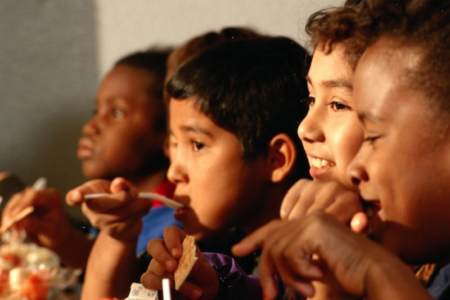 hange. Among the things that needed improvement, better gym equipment and more soccer field upkeep were popular topics. Another hot topic was school lunch. Students were frustrated by too many pre-packaged and processed food options. Fresh fruit and vegetables were only available once a week; and where was the fully-loaded salad bar like the one at the other district high school? Students passionate about changing school lunch referred Melissa to their likeminded friends, and those friends referred her to their friends. The next thing everyone knew, an all-school assembly was planned, and that’s where the student organizing committee was born.
hange. Among the things that needed improvement, better gym equipment and more soccer field upkeep were popular topics. Another hot topic was school lunch. Students were frustrated by too many pre-packaged and processed food options. Fresh fruit and vegetables were only available once a week; and where was the fully-loaded salad bar like the one at the other district high school? Students passionate about changing school lunch referred Melissa to their likeminded friends, and those friends referred her to their friends. The next thing everyone knew, an all-school assembly was planned, and that’s where the student organizing committee was born.
Learn: “What are the consequences of eating like this over and over again on my body?” A group of students asked this question of a pediatrician while showing him a laminated picture of a typical Sunset High lunch.
The students asked the experts to dream big. “If you could wave a magic wand” they asked “what would you do to fix our lunches?”
Frame Issue: The Sunset High Student Organizing Committee decided the best way to figure out how to bring healthy foods into their school was to talk to some experts. Groups of 5 or 6 students met with various professionals who knew the way food works in the public school system. They met with a pediatrician, the school superintendent, the school district head of nutrition, and other community members who had successfully brought healthier foods into their areas of influence. The youth prepared heavily for these meetings, planning questions and practicing how the conversations might go.
DEVELOPMENT
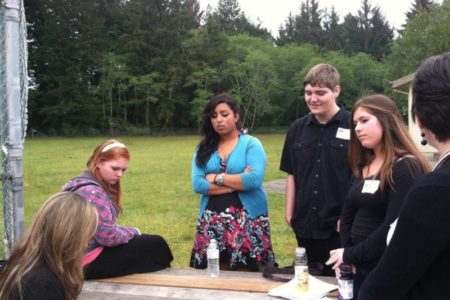
Education: During their research, the students discovered how lunches had gotten so bad at their school in the first place. 10 years ago, Sunset High was a drop-in school; most of the students just took one or two classes there and didn’t need lunch. What worked for students back then was a snack shop, a place where they could grab a quick, pre-packaged snack. Fresh fruit and vegetables weren’t necessary since they would just be left to spoil. When asked if the school district knew how bad the food was at Sunset these days, the district said they had no idea; no one had said anything till now.
Mobilization: Anyone could join the committee; there was no GPA requirement or teacher recommendation, just a group of a few dozen students, ready to bring health back into their schools. The committee met on a regular basis, during 3rd period. After brainstorming and discussing the issues that mattered to the student body, the committee narrowed the list down to 3. They took these 3 issues and asked their peers which issue they’d like to see addressed the most. Based on the responses, the student committee decided to put their energy into a school lunch revolution.
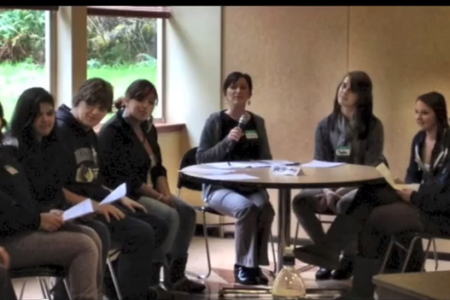
The students knew that they couldn’t just march up to their principal and demand better lunches, so they began researching what their specific ask would be and how they might make it happen.
Debate: The students also learned about the business side of school lunch, like USDA reimbursement, food distribution, unions, and food safety laws. They talked to the school district about the economic tradeoffs of getting more fruits and vegetables on their plates. The students figured out that if they gave up the already unpopular frozen hamburgers and frozen pizza, the district could add fresh fruits and vegetables and the budget would break even.
With all this new knowledge, the students began to finalize a plan that met their needs as well as the school district’s. They wanted a salad bar/hot meal option on Tuesdays, Wednesday, and Thursdays, and to move the school’s beloved spicy chicken sandwich to being served on Mondays. This way, if there were leftovers from the salad bar on Thursday, they could be served again on Friday. The students were afraid that if they had a salad bar on Friday and there were leftovers, the district might shut it down because of waste. Meeting with the experts helped the students to see solutions from all angles.
After surveying the student body about the proposed plan, the Student Organizing Committee was able to come up with their final 4 policy requests: a hot entre and a salad bar three days a week, keep the spicy chicken sandwich one day a week, implement all these changes by May 21st, and have a follow up meeting with the deputy superintendent in June.
ENACTMENT
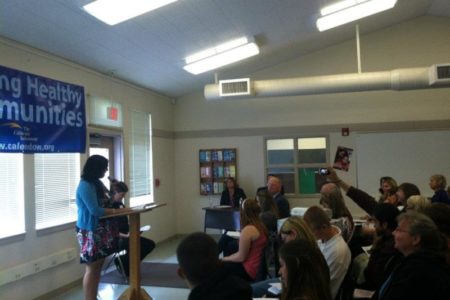
Activation: The students at Sunset High brought the policy-making to the people by hosting the action meeting at their own school, inviting everyone— teachers, parents, policy makers, community members and students—to attend. Tons of planning went into the meeting. From the agenda to the presentations to the invitations—the students were responsible for it all.
Frame Policy: The meeting began with a reflection on the values all the stakeholders had in common. Next, a few students gave testimony on how these healthier school lunches would personally impact them. One young man who wrote a testimony planned to join the army after graduation. He talked about how he needed to be healthy and strong in order to fight for our country, and that he couldn’t be a strong soldier if he continued to be fed junk food at school.
Change: After the speeches, the students presented all their research, gave reports, and announced their solutions. The deputy superintendent Rodney Jahn was invited up to the front, where he was asked if he could grant the students their 4 policy objectives.
His answer was a resounding, “yes.”
What better way to hold a policy maker accountable then to have him stand up in a room full of people and commit his support?
IMPLEMENTATION
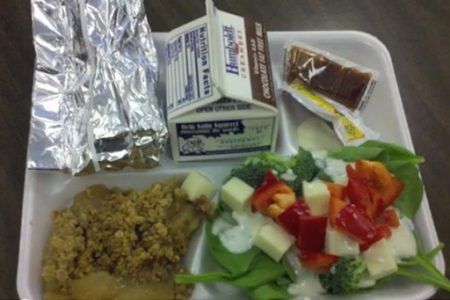
Implementation: And so just a week later, students’ lunch trays were looking better than ever!
Equity/Sustainability: But the story doesn’t end there. The students still had to deal with some implementation issues, like how to track students who received free and reduced lunch, portion sizing, and what to do about seconds and leftovers. Lasting change rarely happens with a simple yes or no, but it is a process that must continually be tweaked, played around with and reworked.
A healthier, more balanced lunch is not the only thing students at Sunset High gained. They now have the leadership skills they need to continue to make a lasting impact in the Del Norte community. Because of the success at Sunset, other local schools and even some parent groups want to begin community organizing initiatives. What started as a big dream, ended in a healthy reality; no magic wand required!
Students advocated and administration listened. Read more about the successful push Sunset High students made for healthier lunches in school. Read the news article and view their YouTube video.
Learn more about Building Healthy Communities and the many other wonderful transformations taking place in Del Norte County and adjacent tribal lands by clicking here.
This success story was produced by Salud America! with support from the Robert Wood Johnson Foundation.
Stories are based on and told by real community members and are the opinions and views of the individuals whose stories are told. Organization and activities described were not supported by Salud America! or the Robert Wood Johnson Foundation.
ABOUT THE PROGRAM
Salud America! The RWJF Research Network to Prevent Obesity Among Latino Children is a national program of the Robert Wood Johnson Foundation. The program aims to educate researchers, decision-makers, community leaders, and the public in contributing toward healthier Latino communities and seeking environmental and policy solutions to the epidemic of Latino childhood obesity. The network is directed by the Institute for Health Promotion Research at the University of Texas Health Science Center at San Antonio.
For more information, visit http://www.salud-america.org.
By The Numbers
142
Percent
Expected rise in Latino cancer cases in coming years
This success story was produced by Salud America! with support from the Robert Wood Johnson Foundation.
The stories are intended for educational and informative purposes. References to specific policymakers, individuals, schools, policies, or companies have been included solely to advance these purposes and do not constitute an endorsement, sponsorship, or recommendation. Stories are based on and told by real community members and are the opinions and views of the individuals whose stories are told. Organization and activities described were not supported by Salud America! or the Robert Wood Johnson Foundation and do not necessarily represent the views of Salud America! or the Robert Wood Johnson Foundation.



